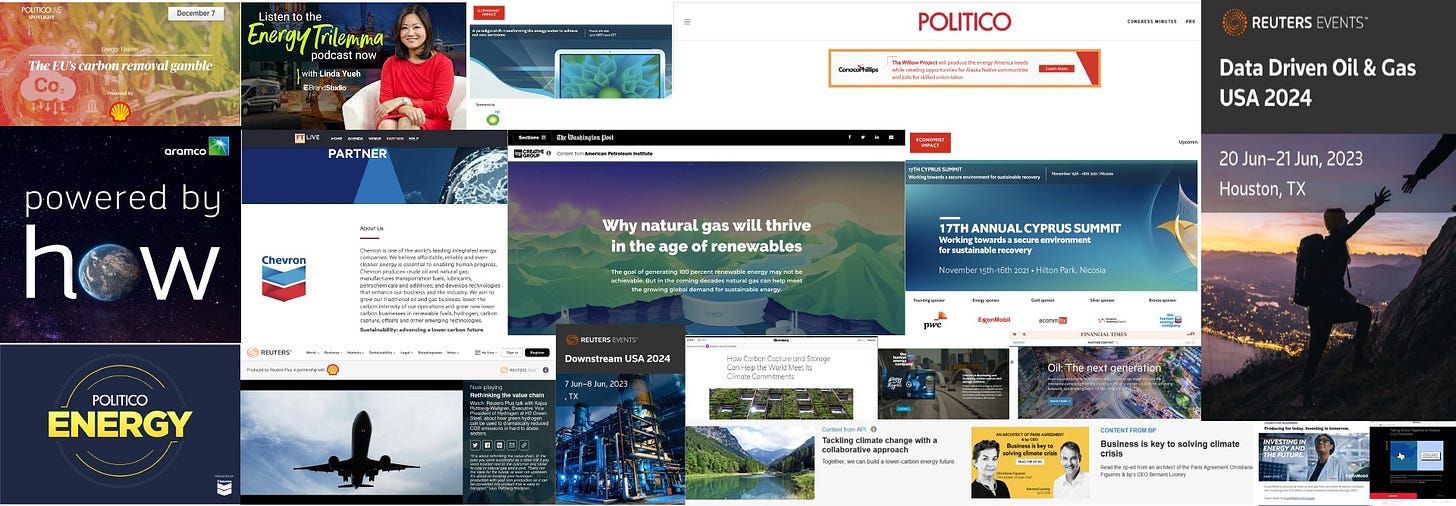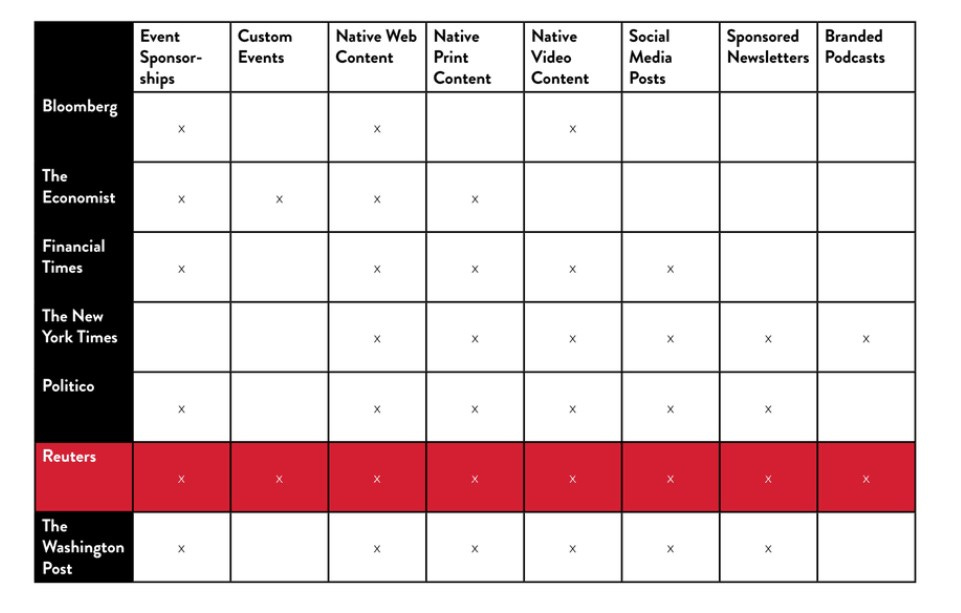50 Reasons Why Reuters Should Stop Working for the Fossil Fuel Industry
The company can show it's serious on climate by ending advertorials and events paid for by oil and gas companies.
“It’s really outrageous that outlets like the New York Times or Bloomberg or Reuters would lend their imprimatur to content that is misleading at best and in some cases outright false.” — Harvard climate disinformation expert Naomi Oreskes.
Building on our Power to Relate course last month, Daniel Simpson and I are now offering monthly men’s group sessions, starting on Sunday at 1900 GMT. Sessions run for 90 minutes. For more info and to book a spot, click here. To see us explain what to expect, see Resonant World #57 for a short video we recorded with my wife Dr Genevieve von Lob, a clinical psychologist and conscious parenting coach, and creator of The HSP Revolution newsletter.
Resonant World #58
Climate journalist Amy Westervelt, DeSmog researcher Joey Grostern and myself published a story in The Nation, The Intercept, Drilled and DeSmog this week documenting the extent to which in-house studios at trusted media such as Reuters and the New York Times are creating sponsored content on behalf of oil majors.
The origins of the story go back to Resonant World #32, where I wrote about my distress at learning that Reuters (where I had worked for years, including as a climate correspondent), was using its events business to convene hundreds of fossil fuel executives in Houston to remove “pain points” holding back production of oil and gas.
I’ve since been lucky enough to have had an opportunity to team up with Amy — a climate hero of mine — to work on a wider story examining the commercial ties between the fossil fuel industry and big media brands. Apart from our stories, Amy also led the production of an accompanying Drilled-DeSmog report, Readers for Sale: The Media’s Role in Climate Delay.
I’ve written before about my personal reflections on my experience of leaving Reuters, and taking a public stance on the company’s oil and gas deals. Publishing these stories feels like a ripening of that at times painful process. (Resonant World#33).
I feel huge love and admiration for Reuters journalists, many of whom do incredible reporting that holds power to account, illuminates human rights abuses in neglected conflicts, and creates transparency where before there was none — often at great personal risk. (To understand those risks, please read this special report on the death of Reuters visuals journalist Issam Abdallah, killed by an Israeli tank shell in October).
The integrity of Reuters journalists has never been in question. But sources we interviewed did question the company’s decision to allow the oil industry to use the reputation those journalists have established over generations to lend a veneer of credibility to its talking points.
In a spirit of solidarity with my former colleagues in the newsroom, here’s why I think this practice must stop.
The oil industry has lied for decades — and continues to lie — about the climate crisis. These deals make Reuters complicit in that lying.
Oil and gas companies are intent on wringing every last drop out of the ground regardless of the consequences for the future of life on Earth. Reuters’ commercial deals with the industry are aiding and abetting the destruction.
Reuters prides itself on “freedom from bias” — a pillar of the much-vaunted Trust Principles the company adopted to preserve its independence during World War Two. Allowing Reuters-branded platforms to serve as a mouthpiece for the fossil fuel industry means Reuters has explicitly and voluntarily sacrificed its core values by taking sides (with the most powerful and wealthiest industry in history).
Many staff oppose these deals. Cancelling them would demonstrate management respects its journalists, and boost (often strained) newsroom morale.
It’s not good enough for senior editorial leadership at Reuters to dodge the issues raised by oil and gas sponsorships by shrugging and saying “that’s an issue for the commercial side of the company.” The people in charge of the newsroom have a greater stake than anyone in ensuring its reputation is not being sold to the highest bidder — especially when the highest bidder is wrecking the climate.
Major figures in the climate world won’t say this to Reuters journalists — because they rely on Reuters to get their message out — but they are privately aghast at the company’s oil and gas events.
It may not be this year. It may not be next year. But demands for climate accountability from the next generation will come. When they do, anyone who was anywhere near the top of a systemically significant media organisation in 2023 had best have their story straight.
Reuters Events tweeting oil industry talking points is embarrassing.
The Reuters Events oil and gas newsletter is so far in the pocket of the industry that it describes natural gas as a “low-carbon” fuel. (If oil companies make adverts saying that, they get banned by the Advertising Standards Authority).
Everyone is to some extent complicit in the economic systems that are driving the death of nature crisis. But even taking a small step to reduce this tension — such as by no longer carrying water for the fossil fuel industry — helps your whole nervous system relax. (Having quit Reuters in 2022, I can vouch for this).
Harvard climate disinformation expert Naomi Oreskes told us: “It’s really outrageous that outlets like the New York Times or Bloomberg or Reuters would lend their imprimatur to content that is misleading at best and in some cases outright false.”
According to Oreskes, events run by media organisations that explicitly endorse the fossil fuel industry’s agenda pose even greater conflicts of interest than advertorials running alongside climate news coverage. “It really crosses the line because now they’re actually manufacturing content,” she said. “They’re manufacturing content that at best is completely one-sided and at worst is disinformation, and pushing that to their readers.”
Bloomberg, Reuters’ closest competitor, produces much more and better climate coverage than Reuters via Bloomberg Green (and it has way fewer commercial deals with fossil). Ending Reuters’ fossil partnerships would help allay any appearance — warranted or otherwise — that the relative paucity of Reuters climate accountability coverage is somehow related to its much more extensive commercial ties with oil and gas.
Reuters needs to attract young talent. Aligning with the fossil fuel industry will make that much harder.
It feels good when your values and your actions are aligned.
Parent company Thomson Reuters has set a target of net zero carbon emissions by 2050. By hosting events designed to remove the “pain points” holding back faster oil and gas production, Reuters Events is undermining this target.
When Thomson acquired Reuters to form Thomson Reuters in 2008, Reuters News suffered an organisational trauma from which it never fully recovered. Ditching the oil and gas deals could be part of a wider renegotiation of the power imbalance between the newsroom and the parent company that would lead to happier staff, better journalism, and fewer deals with major polluters.
All members of Reuters senior leadership team could become heroes to the teenagers in their lives by banding together and announcing to their bosses that they have made a pact to resign if the fossil deals are not rescinded within 48 hours. Watch the parent company comply.
Ending the deals would send such a powerful signal that whistle-blowers would begin to offer Reuters the kinds of agenda-setting climate accountability stories that the newsroom has thus far struggled to deliver.
Reuters News earns $612 million in recurring revenues. Ending the fossil deals won’t break the bank.
In September 2022, UN Secretary-General Antonio Guterres told the UN General Assembly: “We need to hold fossil fuel companies and their enablers to account [including] the massive public relations machine raking in billions to shield the fossil fuel industry from scrutiny.” Events such as “Reuters Events Data Driven Oil & Gas USA” put Reuters in the “enablers” camp.
Reuters was embroiled in a controversy a decade ago when climate coverage fell off a cliff under a former (now late) editor-in-chief who was basically a climate sceptic. Now’s a chance to prove things have really changed.
Reuters says its news reaches two billion people. Any organisation with that level of influence deserves to face scrutiny from a climate accountability perspective — and the fossil fuel deals are a glaring conflict.
Reuters Plus literally made an Aramco-sponsored podcast with a different senior Aramco executive starring in each episode. How can that be allowed?
Last year the U.N.-backed Intergovernmental Panel on Climate Change referenced the role of the communications industry in the climate crisis for the first time. The report stated that “the media shapes the public discourse about climate mitigation” and that this may be “used to impede decarbonisation.” A hint to drop fossil fuel deals?
As Geoffrey Supran, who researches oil industry propaganda at the University of Miama, told us: “I feel like it’s really important not to beat around the bush and to just recognize these activities for what they are, which is literally Big Oil and mainstream media collaborating in PR campaigns for the industry.”
Supran wrote a great twitter thread that lays it all out here.
Climate reporters at major news organisations have alternately described their employers’ partnerships with oil and gas companies as “gross,” “undermining,” and “dangerous.”
Reuters is still a trusted name and severing commercial ties with oil and gas companies would send a strong signal that the world is moving to the post-fossil fuel era, providing confidence that can help support the transition.
The old excuse that “editorial and commercial are separate” does not wash, because multiple studies show that people confuse advertorials for news.
A 2016 Georgetown University study found that advertorials — also known as native advertising — are mistaken for “real” content by about two thirds of people.
A 2018 Boston University study found that only one in 10 people recognised native advertising as advertising, rather than journalism.
A 2016 study conducted by Stanford University researchers found that 80 percent of students mistook native ads for reported stories.
Big Oil-friendly advertorials and events undermine the credibility of Reuters’ many talented journalists — especially climate and energy journalists.
Severing commercial ties with oil and gas companies could create space for other major media to do the same.
As Amy Westervelt has documented, the fossil fuel industry’s practice of buying friendly content dates back to 1970, when Herb Schmertz, Mobil Oil’s vice president of public affairs, worked with The New York Times to create the advertorial. We’ve seen how climate action has gone since then. The content Reuters Plus and Reuters Events are running are descendants of Schmertz’s vision.
Because of everything Amy says in this twitter thread.
A lot of the industry sponsored content running under the Reuters brand is promoting “false solutions” such as carbon capture and storage and hydrogen, creating a false sense of security among readers that the fossil fuel industry is stepping up to address the climate crisis.
As Peter Kalmus, a Nasa climate scientist, wrote in Newsweek: “In 2021, six fossil fuel executives testified before congress. They were Darren Woods, CEO of ExxonMobil; Michael Wirth, CEO of Chevron; David Lawler, CEO of BP America; Gretchen Watkins, president of Shell Oil; Mike Sommers, president of the American Petroleum Institute; and Suzanne Clark, president and CEO of the U.S. Chamber of Commerce. When asked in several instances by Congress if they would agree to stop spending to spread disinformation and block climate action, these fossil fuel executives refused. They clearly signaled to the world that they plan to blithely continue dishonestly destroying Earth’s habitability for the sake of corporate greed.” (Chevron sponsors the Reuters Impact climate event).
If we stick to the idea that we are all by-standers in this crisis with no agency it will become a self-fulfilling prophecy and the world will burn.
Because even with the most compartmentalized mode of thinking, the idea that Chevron should be sponsoring a climate event such as Reuters Impact, held in London in September, must surely lead to painful cognitive dissonance?
The Reuters office in Time Square was blanketed with smoke from the Canadian wildfires over the summer.
To paraphrase Bill McKibben: Business as usual is what’s doing us in.
A couple of years ago, the newsroom rebelled when Thomson Reuters moved to join an innocuous UK government scheme known as the Veterans Covenant, which aims to encourage hiring of military veterans. Journalists saw it as a clear violation of the Trust Principle of “freedom from bias” since it would appear — at least if you squint — to align Reuters with the UK military. Surely, offering Reuters name to fossil fuel companies in search of greenwash-for-hire is a wildly more egregious violation, at this moment of climate consequence?
The oil and gas companies buying this content are talking about transitioning to clean energy — but not actually doing it, as multiple reports, including this peer-reviewed study, demonstrate.
Of all the outlets we reviewed, only Reuters offers fossil fuel advertisers every possible avenue to reach its audience, including custom events, advertorials, podcasts, sponsored newsletters and events sponsorships, as shown by this table from our report:
Because how do you want to be remembered?
Because if you do, I guarantee sympathetic coverage in Resonant World.
Because — as IPPC author Karen O’Brien argues — You Matter More Than You Think.
Senior Reuters editors have made it clear that they don’t want to be seen as “climate warriors” for fear of undermining Reuters’ reputation for impartiality. Okay. But tacitly endorsing these fossil fuel deals is, at least in my view, a far greater threat to the company’s credibility. Why not take a stand?
Thank you for your attention.
Climate Consciousness 2023
A reminder that the amazing Climate Consciousness Summit 2023 continues today, with more speakers who are not sponsored by Chevron.
A labour of love, Resonant World is written in the gaps between work I get paid to do, notably editing investigations at nonprofit climate news service DeSmog. It’s a huge boost when people become paid subscribers, and support of any amount affirms that my mission to support the global community of practitioners engaged in supporting people to integrate individual, inter-generational and collective trauma has value. Thank you!








